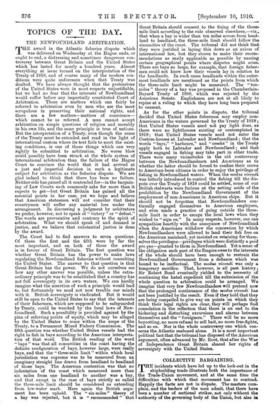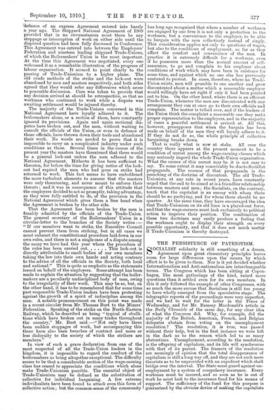COLLEC1.1.V.E. BARGAINING.
incidents which have led up to the lock-out in the shipbuilding trade illustrate both the importance of the Trade-Union movement, and at the same time the difficulties with which that movement has to contend. Happily the facts are not in dispute. The masters com- plain, and the leaders of the men admit, that there have been a number of sectional strikes, not only without the authority of the governing body of the Union, but also is 'defiance of an express Agreement entered into barely a year ago. The Shipyard National Agreement of 1909 provided that in no circumstances must there be any stoppage or interruption of work on either side until the disputed question had been fully discussed in Conference. This Agreement was entered into between the Employers' Federation and nineteen leading shipyard Trade-Unions, of which the Boilermakers' Union is the most important. At the time this Agreement was negotiated, every one welcomed it as a remarkable illustration of the progress of labour organisation. It seemed to point clearly to the passing of Trade-Unionism to a higher plane. The old crude methods of the strike and the lock-out were abandoned by men and masters respectively, and both sides agreed that -they would refer any differences which arose to peaceable discussion. Care was taken to provide that any decision arrived at should be retrospective, so that no workman who continued to work while a dispute was awaiting settlement would be injured thereby.
The majority of the Trade-Unions concerned in this National Agreement have loyally adhered to it. The boilermakers alone, or a section of them, have constantly ignored its provisions. Again and again sectional dis- putes have broken out, and the men, without waiting to consult the officials of the Union, or even in defiance of those officials, have thrown down their tools and abandoned their work. No words are needed to prove that it is impossible to carry on a complicated industry under such conditions as these. Several times in the course of the present year the masters have threatened that there would be a general lock-out unless the men adhered to the National Agreement. Hitherto it has been sufficient to threaten, for before the time for giving notice of the lock- out had expired the men who had gone on strike had returned to work. This fact seems to have emboldened the more turbulent elements to assume that the masters were only threatening, and never meant to enforce their threats ; and it was in consequence of this attitude that the employers decided to act so promptly, taking advantage, as they were fully entitled to do, of the provision in the National Agreement which gives them a free hand when the Agreement is broken by the other side.
That the Agreement has been broken by the men is frankly admitted by the officials of the Trade-Union. The general secretary of the Boilermakers' Union in a circular-letter to the branches of the Society writes :— " If our members want to strike, the Executive Council cannot prevent them from striking, but in all cases we must exhaust the constitutional procedure laid down in our own rules, and there is not a single case of a dispute among the many we have had this year where the procedure of the rules has been carried out This lock-out is directly attributable to small bodies of our own members taking the law into their own hands and acting contrary to the advice of all the officials in the Society, both local and national." This is quite as emphatic as the statements issued on behalf of the employers. Some attempt has been made to explain the situation by suggesting that the boiler- makers are a peculiarly undisciplined body of men, owing to the irregularity of their work. This may be so, but, on the other hand, it has to be remembered that for some time Past responsible Trade-Union leaders have been protesting against the growth of a spirit of indiscipline among the men. A. notable pronouncement on this point was made in a recent circular from Mr. Thomas Burt to the Miners' Federation. Speaking of the strike on the North-Eastern , Railway, which he described as being " typical of ebulli- tions which have broken out in many trades throughout the country," Mr. Burt said :—" Not only have there • been sudden stoppages of work, but accompanying this there have also been breaches of contract and more or less disloyalty to the society of which the strikers are ' members.'
In view of such a grave declaration from one of the most respected of all the Trade-Union leaders in the kingdom, it is impossible to regard the conduct of the boilermakers as being altogether exceptional. The difficulty seems to be that a considerable section of the wage-earning class has ceased to appreciate the conditions which alone make Trade-Unionism possible. The essential object of Trade-Unionism may be defined as the substitution of collective for individual bargaining. A few extreme individualists have been found to attack even this form of collective action ; but the common-sense of the community has long ago recognised that where a number of workmen are engaged by one firm it is not only a protection to the workmen, but a convenience to the employer, to be able to bargain with the men collectively instead of singly. This consideration applies not only to questions of wages, but also to the conditions of employment, so far as they affect the comfort and convenience of the men. In practice it is extremely difficult for a workman, even if he possesses more than the normal amount of self- assurance, to go and complain to his employer about conditions of work which may have been in existence for some time, and against which no one else has previously ventured to protest. In cases, therefore, where no Trade- Union exists, men will grumble to one another and grow discontented about a matter which a reasonable employer would willingly have set right if only it had been pointed out to him. On the other hand, where there is an efficient Trade-Union, whenever the men are discontented with any arrangement they can at once go to their own officials and complain. The matter is talked over, and if the leaders of the Union think the complaint a reasonable one they make proper representation to the employers, and in the majority of cases a peaceful settlement is arrived at. All this, however, presupposes that when the bargain has been made on behalf of the men they will loyally adhere to it. If they do not do so, the whole principle of collective bargaining breaks down.
That is really what is now at stake. All over the country there appears at the present moment to be a condition of unrest among the wage-earning classes which may seriously imperil the whole Trade-Union organisation. What the causes of this unrest may be it is not easy to say. To some extent it may conceivably be due to Socialist propaganda. The essence of that propaganda is the preaching of the doctrine of discontent. The old Trade- Unionists, at any rate in recent years, have constantly urged that the end to be aimed at is a friendlier relationship between masters and men ; the Socialists, on the contrary, teach that the capitalist is an enemy with whom there should be no parleying, and for whom there should be no quarter. At the same time, they have encouraged the idea that Trade-Unionism on its old lines is a played-out force, and that the wage-earners must look exclusively to political action to improve their position. The combination of these two doctrines may easily produce a feeling that the workmen ought to display their strength on every possible opportunity, and that it does not much matter if Trade-Unionism is thereby destroyed.







































 Previous page
Previous page